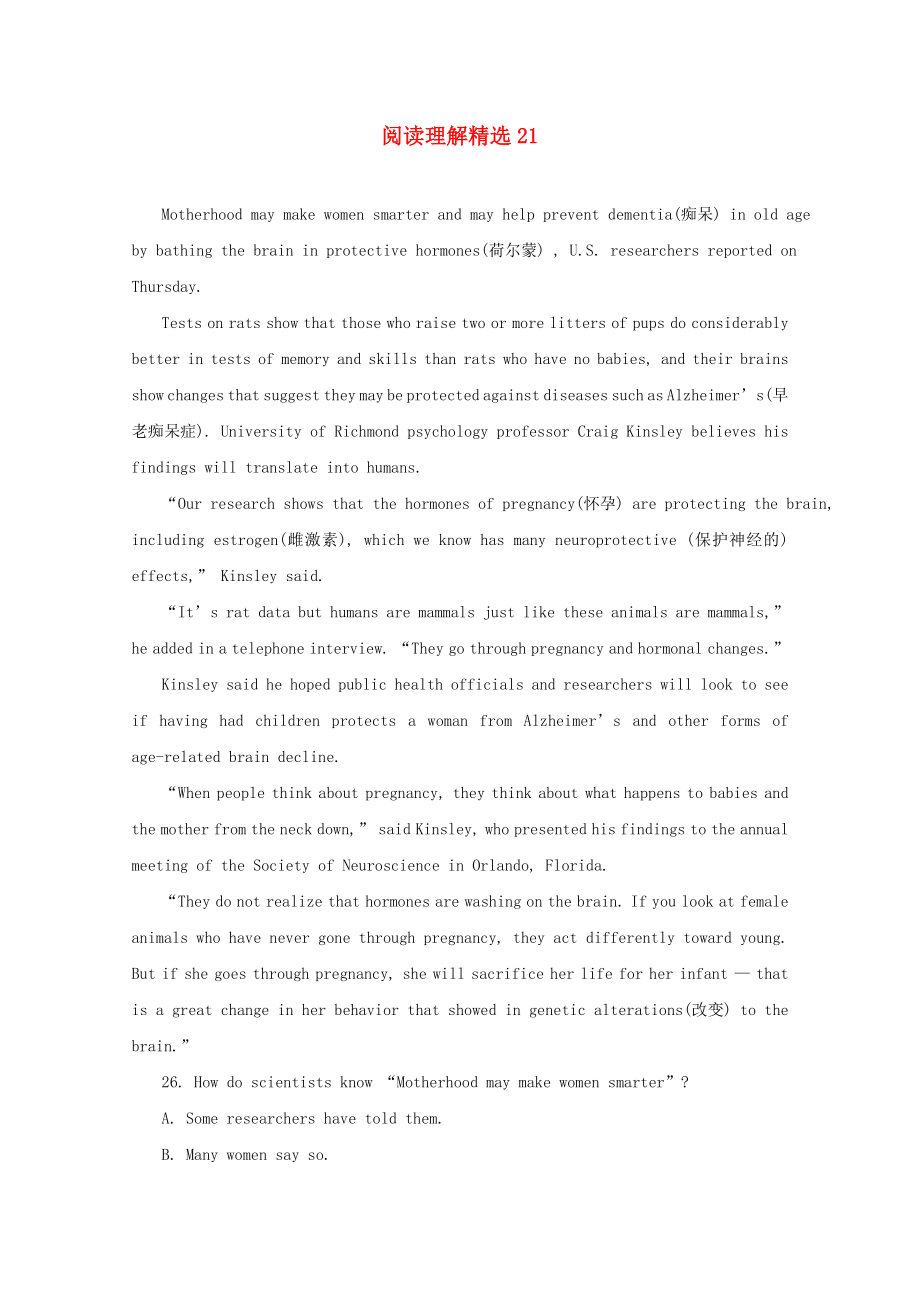《廣東省2013年高考英語(yǔ)二輪復(fù)習(xí) 同步專題 閱讀理解21》由會(huì)員分享,可在線閱讀���,更多相關(guān)《廣東省2013年高考英語(yǔ)二輪復(fù)習(xí) 同步專題 閱讀理解21(3頁(yè)珍藏版)》請(qǐng)?jiān)谘b配圖網(wǎng)上搜索���。
1、閱讀理解精選21
Motherhood may make women smarter and may help prevent dementia(癡呆) in old age by bathing the brain in protective hormones(荷爾蒙) , U.S. researchers reported on Thursday.
Tests on rats show that those who raise two or more litters of pups do considerably better in tests of memory and skil
2���、ls than rats who have no babies, and their brains show changes that suggest they may be protected against diseases such as Alzheimer’s(早老癡呆癥). University of Richmond psychology professor Craig Kinsley believes his findings will translate into humans.
“Our research shows that the hormones of pregnan
3���、cy(懷孕) are protecting the brain, including estrogen(雌激素), which we know has many neuroprotective (保護(hù)神經(jīng)的) effects,” Kinsley said.
“It’s rat data but humans are mammals just like these animals are mammals,” he added in a telephone interview. “They go through pregnancy and hormonal changes.”
Kinsl
4、ey said he hoped public health officials and researchers will look to see if having had children protects a woman from Alzheimer’s and other forms of age-related brain decline.
“When people think about pregnancy, they think about what happens to babies and the mother from the neck down,” said Kinsl
5���、ey, who presented his findings to the annual meeting of the Society of Neuroscience in Orlando, Florida.
“They do not realize that hormones are washing on the brain. If you look at female animals who have never gone through pregnancy, they act differently toward young. But if she goes through pregn
6���、ancy, she will sacrifice her life for her infant — that is a great change in her behavior that showed in genetic alterations(改變) to the brain.”
26. How do scientists know “Motherhood may make women smarter”?
A. Some researchers have told them.
B. Many women say so.
C. They know it by experimenti
7���、ng on rats.
D. They know it through their own experience.
27. What does the phrase “l(fā)itters of pups” mean in the second paragraph?
A. Baby rats. B. Animals.
C. Old rats. D. Grown-up rats.
28. What can protect the brain of a woman according to the passage?
A. Estrogen. B. Th
8���、e hormones of pregnancy.
C. More exercise. D. Taking care of children.
29. “It’s rat data but humans are mammals just like these animals are mammals.” What does the sentence suggest?
A. The experiments on the rats have nothing to do with humans.
B. The experiments on the rats are ver
9���、y important for animals.
C. The experiments on the rats are much the same on humans.
D. The experiments on the rats are much the same on other animals.
30. Which title is the best for this passage?
A. Do You Want to Be Smarter? B. Motherhood Makes Women Smarter
C. Mysterious Hormones D.
10、 An Important Study
[答案及解析] 26—30 CABCB
本文介紹了一個(gè)觀點(diǎn):母性特點(diǎn)能使婦女變得更加聰明靈敏���。
26. C���。細(xì)節(jié)題。根據(jù)Tests on rats show… 可知科學(xué)家是通過做老鼠實(shí)驗(yàn)得出這個(gè)結(jié)論���。
27. A���。詞義猜測(cè)題。后面的對(duì)比who have no babies���,實(shí)際上提供了一個(gè)相反的情況���,所以我們可以推測(cè)those who raise two or more litters of pups中的litters of pups指的是“剛出生不久的小老鼠”���。
28. B。細(xì)節(jié)題���。根據(jù)文章第 3 段中的 …the hormones of pregnancy(懷孕) are protecting the brain可得出答案���。
29. C。句意理解題���?��?茖W(xué)家通過用老鼠做實(shí)驗(yàn)來說明人的問題。因?yàn)槿撕屠鲜蠖紝儆诓溉閯?dòng)物���,很多生理機(jī)能都相同���。
30. B。主旨題。短文第1句 Motherhood may make women smarter 是主題句���,據(jù)此我們可以得出答案���。
 廣東省2013年高考英語(yǔ)二輪復(fù)習(xí) 同步專題 閱讀理解21
廣東省2013年高考英語(yǔ)二輪復(fù)習(xí) 同步專題 閱讀理解21

